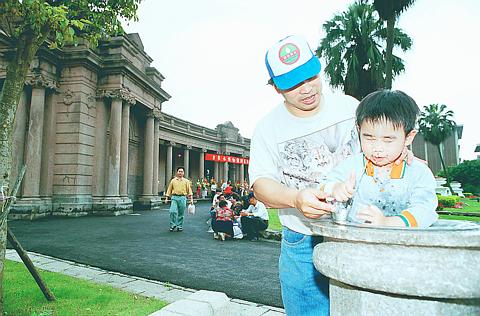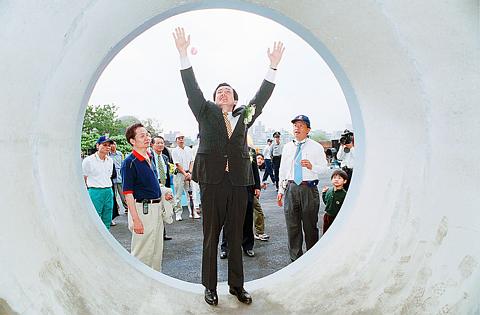Taiwan's first museum devoted to drinking water reopened yesterday to coincide with Labor Day celebration activities.
Holding a cup of tap water in his hand at yesterday's opening ceremony, Taipei City Mayor Ma Ying-jeou (馬英九) recounted a childhood anecdote.
"When I was little, I used to drink tap water without my parents' knowledge, because it was not safe to drink," he said. "Now I drink it everyday both at work and at home."

PHOTO: GEORGE TSORNG, TAIPEI TIMES
According to Ma, piped water was available in Taipei from 1885. But it was not until Taiwan's retrocession in 1945 that tap water became completely accessible to the general public -- and has now "come of age"
"Drinkable water is an indicator of modernization," Ma said.
To prove the safety of the city's water, Ma gulped down the water in the cup, then asked for more.

PHOTO: GEORGE TSORNG, TAIPEI TIMES
"Even though it's just a small cup, it takes a lot of people's efforts to make it possible," Ma said.
The reopening of the museum has historical significance.
The Baroque-style building which houses the museum was originally built in 1908, and declared a third-class historic site in 1993.
It houses nine water pumps which were used to draw off water from Hsintien River. The water was then purified at the water treatment facility before being sent on to a reservoir at Kuanyin Mountain (觀音山).
However, because of the deterioration in the quality of the water supply, the pumping facility was relocated northward to the upper stream at Chingtanyen (青潭堰) in 1977.
The water treatment facility then became the third of its kind for the city, treating 520,000 tons of water everyday.
The museum was first open in September 1993, but was shut down in 1998 for renovation.
The NT$80 million, two-year project has instilled new life in the main building and the surrounding 7,800-ping (25,740 square meter) area, which includes the water treatment facility, an outdoor equipment display area, a hillside sidewalk area, and a playground.
Tsay Huel-sheng (蔡輝昇), director general of the Taipei Water Department (台北自來水事業處), said the establishment of the museum has its own purpose.
"We would like the public to know that water is a valuable and non-replaceable natural resource," he said.
"Ninety-seven percent of the earth's water is seawater, while three percent is fresh water, but of that three percent, three-fourths of it is located in the area of the Arctic and Antarctic Poles, so that leaves us a fairly limited amount of fresh water available," Tsay said.
Tsay also cited the impressive performance of the department, citing gross revenue from January through March this year to have been registered at NT$560 million, about NT$200 million more than targeted. Tsay said he expects the number to reach NT$720 million in two months.
The Drinking Water Museum is located at No. 1, Szuyuan Street in the Kungkuan area. It is open to the public daily from 9am to 5pm. Tickets are NT$60 for adults, and NT$30 for the disabled, senior citizens, students, and soldiers. There is an additional NT$50 charge for each car and NT$150 per bus.
Those interested in visiting the facility can take advantage of the mass transit system, and get off at the Kungkuan stop. The museum is five minutes away on foot on the way to the Yungfu Bridge.

MAKING WAVES: China’s maritime militia could become a nontraditional threat in war, clogging up shipping lanes to prevent US or Japanese intervention, a report said About 1,900 Chinese ships flying flags of convenience and fishing vessels that participated in China’s military exercises around Taiwan last month and in January last year have been listed for monitoring, Coast Guard Administration (CGA) Deputy Director-General Hsieh Ching-chin (謝慶欽) said yesterday. Following amendments to the Commercial Port Act (商港法) and the Law of Ships (船舶法) last month, the CGA can designate possible berthing areas or deny ports of call for vessels suspected of loitering around areas where undersea cables can be accessed, Oceans Affairs Council Minister Kuan Bi-ling (管碧玲) said. The list of suspected ships, originally 300, had risen to about

DAREDEVIL: Honnold said it had always been a dream of his to climb Taipei 101, while a Netflix producer said the skyscraper was ‘a real icon of this country’ US climber Alex Honnold yesterday took on Taiwan’s tallest building, becoming the first person to scale Taipei 101 without a rope, harness or safety net. Hundreds of spectators gathered at the base of the 101-story skyscraper to watch Honnold, 40, embark on his daredevil feat, which was also broadcast live on Netflix. Dressed in a red T-shirt and yellow custom-made climbing shoes, Honnold swiftly moved up the southeast face of the glass and steel building. At one point, he stepped onto a platform midway up to wave down at fans and onlookers who were taking photos. People watching from inside

Japan’s strategic alliance with the US would collapse if Tokyo were to turn away from a conflict in Taiwan, Japanese Prime Minister Sanae Takaichi said yesterday, but distanced herself from previous comments that suggested a possible military response in such an event. Takaichi expressed her latest views on a nationally broadcast TV program late on Monday, where an opposition party leader criticized her for igniting tensions with China with the earlier remarks. Ties between Japan and China have sunk to the worst level in years after Takaichi said in November that a hypothetical Chinese attack on Taiwan could bring about a Japanese

STREAMLINED: The dedicated funding would allow the US to transfer equipment to Taiwan when needed and order upgraded replacements for stockpiles, a source said The US House of Representatives on Thursday passed a defense appropriations bill totaling US$838.7 billion, of which US$1 billion is to be allocated to reinforcing security cooperation with Taiwan and US$150 million to replace defense articles provided to the nation. These are part of the Consolidated Appropriation Act, which the US House yesterday passed with 341 votes in favor and 88 against. The act must be passed by the US Senate before Friday next week to avoid another government shutdown. The US House Committee on Appropriations on Monday unveiled the act, saying that it allocates US$1 billion for the Taiwan Security Cooperation Initiative